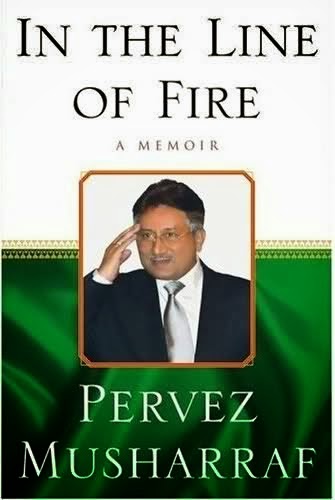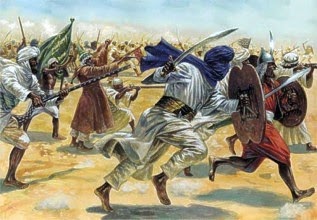In the line of fire by Pervaiz Musharraf
Memory is an exaggeration. A necessary one if you are the most indulged dictator on duty. When Pervez Musharraf, the absolute ruler of a country condemned by both history and geography, remembers, it is more than an argument with a hoary past. It is a project in iconography - and vanity's last battle with truth.
It is a luxury only a few of his tribe can afford. As one of them rants and raves from a courtroom in Baghdad, wagging his accusatory finger at the judge, the other fortunate one accepts jasmine tea and a twinkie from the host of The Daily Show to market his personal mythology in New York. Musharraf is special, and in the twisted strategy of the war on terror, he is the indispensable General. Browse through the glossary of the post-9/11 world and you realise the enormity of his importance-or the depth of his duplicity.
Taliban, Al Qaeda, Osama bin Laden, the transatlantic airline plot- you just can't miss the proverbial Pakistani angle. For us Indians, he is the familiar bogeyman, and Pakistan is an inevitable motif in the nationalist narrative. Irresistible evil, paranoid partner, savvy saboteur, ruthless bargainer, uniformed moderniser - Musharraf plays each part with puffed up panache.
Musharraf with wife SehbaNow we are with Musharraf the bestselling memoirist. In the Line of Fire, oozing that detached elegance of ghost writing, is an admirable attempt in increasing one's historical size. His race is against history, whose judgement he wants to pre-empt with his own story of heroism and "statesmanship".
Nowhere in the book could be seen Musharraf the mastermind of a military coup that halted the evolution of a civil society across the border. Nor could be visible the benefactor of Taliban or the instigator of Kargil. The vulpine negotiator at Agra is out of this book. So is the General who arms himself by ridiculing the Constitution or the President who has made the best use of America's war on terror.
In the Line of Fire invites us to toast a daredevil commando and an honourable gentleman, a restorer of national stability and a fighter for subcontinental peace, a frontline warrior pitted against Islamic guerrillas and a benevolent statesman who is doing the groundwork for a democratic Pakistan. We are being treated to the life and times of the Supreme Redeemer of the Islamic Republic. We are reading the gospel according to the Chosen One. A voluntary suspension of disbelief is a pre-requisite for enjoying In the Line of Fire as the testament of a man whose ambition and adventure have made the world a little more dangerous- and his neighbour a lot more anxious.
Musharraf with Nawaz Sharif in KargilHe hardly suffers from modesty when he links his destiny to his nation's: "The story of my life coincides almost from the beginning with the story of my country-so the chapters that follow are a biography not only of a man, but of Pakistan as well."
Appropriately enough, the story begins on August 14, 1947, and the General goes lyrical while capturing the zeitgeist: "These were troubled times. These were momentous times. There was the light of freedom; there was the darkness of genocide. It was the dawn of hope; it was the twilight of empire. It was a tale of two countries in the making."
On a humid summer day, in the train from Delhi to Karachi, there was a four-year-old boy, watching his father guarding a precious box. It contained Rs.7,00,000, and Musharraf pere, a foreign office accountant, was carrying it for the new country. Born in 1943 in a liberal, secular middle-class family in old Delhi, Musharraf spent his formative years in Karachi and Ankara, where his father had been posted for a while.
In the Line of Fire is least fictional whenever it deals with nostalgia, though its author never misses an opportunity to emphasise his early epiphanies: "A metamorphosis took place in me in the first months and years after Partition. An uprooted little boy found earth that was natural to him. He took root in it for ever. I would protect that earth with my life."
Musharraf as a sportsman in north PunjabThe Musharraf of the first few chapters is romantic, athletic and driven. In Turkey, he develops his lifelong fondness for sport and dogs. In St Patrick's in Karachi, he is naughty and smart. At 15, he has his first romance: "This girl was very beautiful. It was puppy love, really…" Next it was a "beautiful Bengali girl" from East Pakistan. "This crush was somewhat less frivolous than my first."
Disappointingly, the narrative is rather perfunctory whenever it comes to the personal. Well, when you are the chosen one on a higher mission, you can't afford to waste words for girlfriends and puppy loves. Myth-making is serious business, and in Musharraf's case, it is a commando performance. It was the 1965 war that was his baptism in fire: A "fiery young officer all out of control" was on his way to bigger things. He was a captain in the Special Services Group-"our elite commando outfit, the world's best"-when he married "the extremely beautiful" Sehba Farid, chosen by his aunt.
There was a time when he thought he would be retiring from the army as a lieutenant-general. Prime minister Nawaz Sharif would make him the chief, a mistake that would cost the discredited democrat his job and country. Musharraf was getting closer to his mission.
Musharraf coming out of the Holy Kaaba in MeccaKargil would mark the pinnacle of his adventure. Musharraf takes refuge in macho fiction to make the war on the snowy peaks a heroic moment of the Pakistani Army- and Sharif's suicidal blunder. The so-called "Kashmiri freedom fighting mujahideen" who occupied the Kargil heights were actually Pakistani commandos masquerading as jehadists. As Steve Coll writes in his Ghost Wars, "for Musharraf, as for many other liberal Pakistani generals, jehad was not a calling, it was a professional imperative. It was something he did at the office."
And that explains his sponsorship of the Taliban in the name of "strategic depth" and his sneaking admiration for Osama and Mullah Omar: they are "cult heroes" and "enigmas". It is only a matter of time before Bin Laden is caught, he thinks. His guess is that Osama's hideout is in the Konar area along the Pakistan-Afghanistan border. No one is in a position to make a better guess.
He is aware of his power, and he displays it with minimum finesse in passages that chronicle the sacrifices Pakistan has made in the global war on terror: "Pakistan is the one country in the world that has done the maximum in the fight against terrorism." Unfortunately, this finely packaged joke has takers in Washington and elsewhere, even as the thriving cottage industry of jehad in the Musharraf country takes the sheen out of the post-9/11 morality of George Bush, who, defeating his own idealism, continues to value the partnership with the General.
Musharraf with President George BushConsistently let down by jingoistic generals and corrupt democrats, Pakistan, the lost country of South Asia, is the ideal stage for self-styled liberators. Musharraf, a self-conscious, media-friendly sophisticate among dictators, too, sees himself as a savior in a wretched country. Still, he, a secular liberal by upbringing, knows that his power doesn't have popular legitimacy. That is why the idea of enemy is so crucial to his survival.
That is why India is an essential object of hate in his story, which, spread over 352 pages, in most parts is a boast as well as a lie. He hopes to see Pakistan emerging as "a state that is a model to be emulated, not shunned". Of course, what is required to achieve that goal is the missionary zeal of the man from Nehar Wali Haveli in pre-Partition Delhi.
The memoirist has the freedom to lie; those who have suffered enough from the many battles of Pervez Musharraf have the freedom to declare that he is a model to be shunned-for the sake of the subcontinent and beyond.
In the Line of Fire triumphs as the marketing skill of a dangerous mind. Resist it if you can. We couldn't.




thanks sir link is updated
ReplyDelete